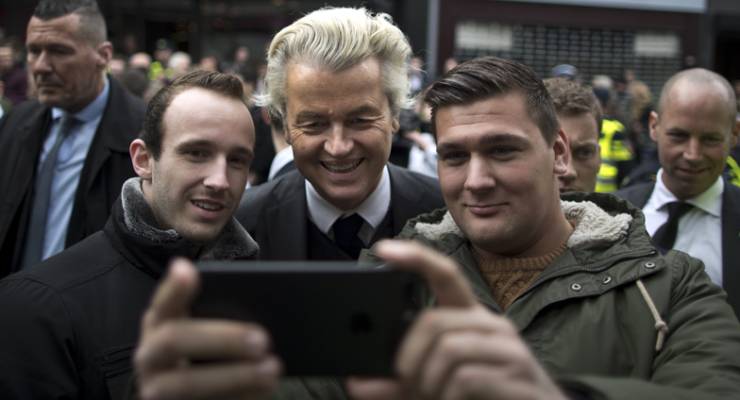
The dismal election result in Western Australia for One Nation and other hard-right candidates has confirmed that the momentum of right-wing racists is not irresistible. This follows recent results in Ecuador, Liechtenstein and Romania where predicted Trumpian surges also failed to eventuate.
The next test of the hard right in a national poll will be Wednesday when the people of the Netherlands — population 17 million — elect their lower house MPs and prime minister.
The Dutch far-right Party for Freedom (PVV) led by Geert Wilders has enjoyed the lead in most opinion polls from mid-2015 until four weeks ago. But with so many parties on offer, his projected seat win has rarely been higher than 38. That’s half the 76 needed to form government.
In recent weeks, incumbent prime minister Mark Rutte of the liberal-conservative People’s Party for Freedom and Democracy (VVD) has moved ahead in the polling, but with the Green-Left Party led by photogenic 30-year-old Jesse Klaver showing an impressive late surge.
Interest remains focused on the peroxided Wilders, however, who has gained global notoriety for his promises to close Dutch borders, shut down mosques, ban the Koran, lock up asylum seekers, leave the European Union and abandon the euro. Brexit on steroids.
He has been a divisive figure for most of his 10 years as PVV leader with a conviction for hate speech, death threats, assassination attempts, allegations of financial fraud and sustained condemnation by religious and human rights groups. He was refused entry to the United Kingdom in 2009, although that was eventually overturned. He visited Australia in 2013 and again in 2015 to launch the anti-Islam Australian Liberty Alliance political party.
[For a bunch of ‘patriots’, Hanson and Co sure do love ripping off foreign ideas]
The Dutch parliamentary system is similar to Australia’s with a 150-seat House of Representatives and a 75-seat Senate, elected for four-year terms by proportional representation. Small parties proliferate, with 12 represented in the current Senate and 11 in the outgoing lower house.
But there are differences: all governments have been coalitions since 1918; and senators are part-timers on a small allowance, so usually have other jobs in the government or elsewhere.
Since 1973, the prime minister — or Minister-President as he is known (yes, they have all been men) — has come from one of three parties.
These are the incumbent People’s Party for Freedom and Democracy, the centre-left Labour Party, and the centre-right Christian Democratic Appeal (CDA).
Religious parties are many, mainstream and successful. The 28 parties contesting Wednesday’s election include CDA, Christian Union, the Party for Human and Spirit, and Jezus Leeft (Jesus Lives). Between 1958 and 1973, prime ministers were all from the Christian parties that merged in 1977 to become the current CDA.
Results at the 2012 elections were satisfactory for both the VVD and Labour but disheartening for all others. The VVD won 41 seats, clear of Labour on 38, but nowhere near the required 76. Next came Wilders’ Party for Freedom (15), the Socialist Party (15), Christian Democratic Appeal (13), Democrats 66 (12), then five minor parties with five seats or fewer.
In a move that turned out good for government as well as politically astute, Mark Rutte formed a coalition with Labour.
Although both Labour and the VVD are now going head to head and will be hoping they share the top two places again, this is not certain.
If opinion polls are a guide, Wilders’ hard-right party could come first or second. Even if he wins, however, most observers reckon he has no chance of the support needed to take any part in government.
[The radical danger of Geert Wilders’ free speech]
Implications for Australia are more symbolic than practical. Geert Wilders enjoys a personal relationship with Cory Bernardi, who was once PM Tony Abbott’s parliamentary secretary but recently left the Liberal Party to form a new apparently hard-right party.
Diplomatic, trade and political connections between the Netherlands and Australia remain positive, as they generally have since traders with the Dutch East Indies company opened commerce with Australia around 1610. They will not be affected by this election.
Wilders’ vote will be regarded as a measure of European support for his policies, which are largely shared by Marine Le Pen in France, Nigel Farage in the UK and others elsewhere. It will indicate whether last year’s hard-right triumphalism following the surprise results in the UK’s Brexit poll and the US election is advancing or receding.
One view is that it may have diminished significantly as the cost of Brexit to the UK is assessed and Trump’s performance so far has caused more consternation than celebration.
So we will wait and see. And perhaps be surprised. Who predicted 40 seats out of 59 for Labor in Western Australia?








Geert Wilders looks like an angry Pekinese dog and his admirers look as if they are henchmen of Al Capone, yet these are the potential leaders of Holland? Jesus Christ!
With support at around 20% or less, Wilders has Buckley’s chance is leading a government.
An idea cannot be held responsible for the people who hold it.